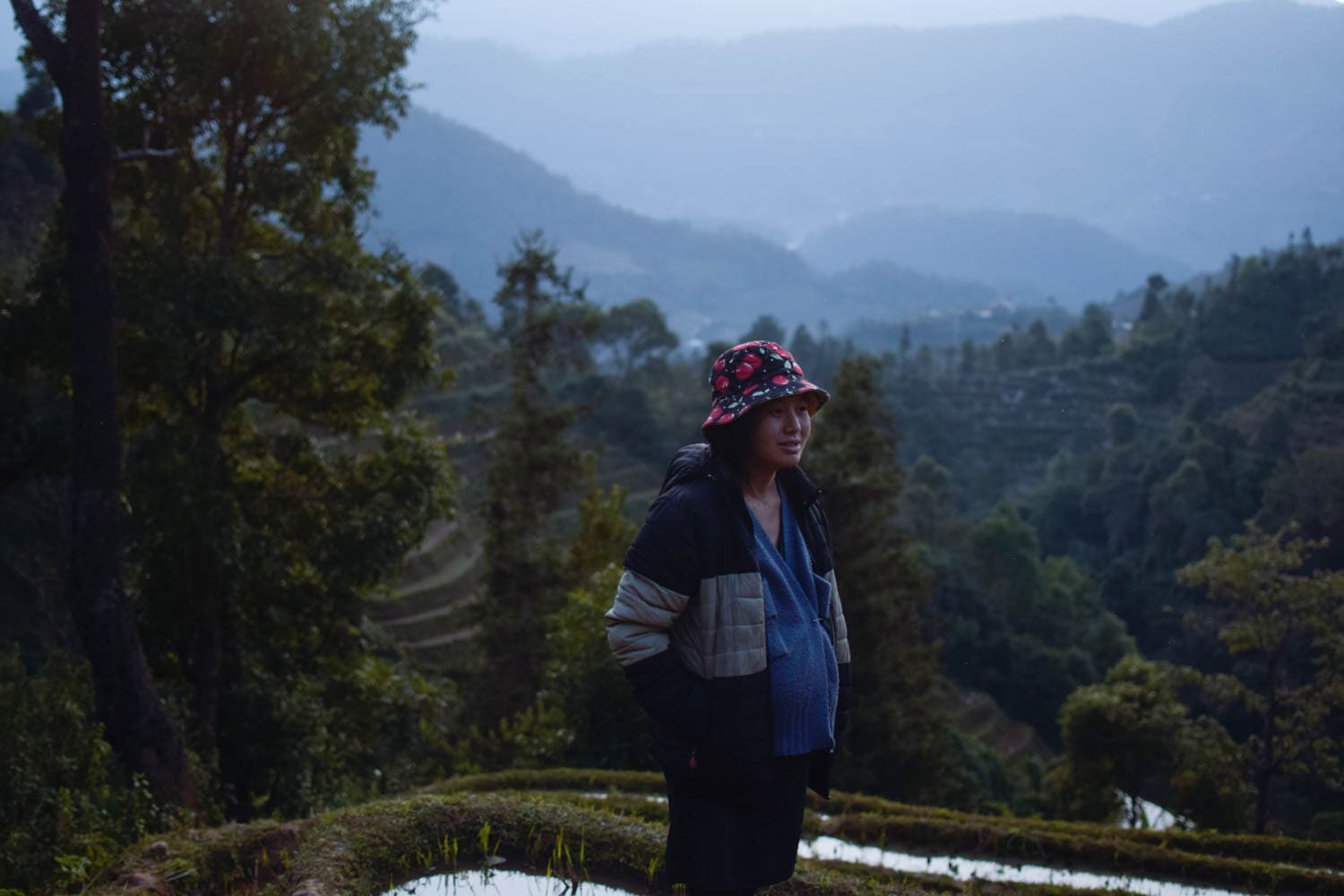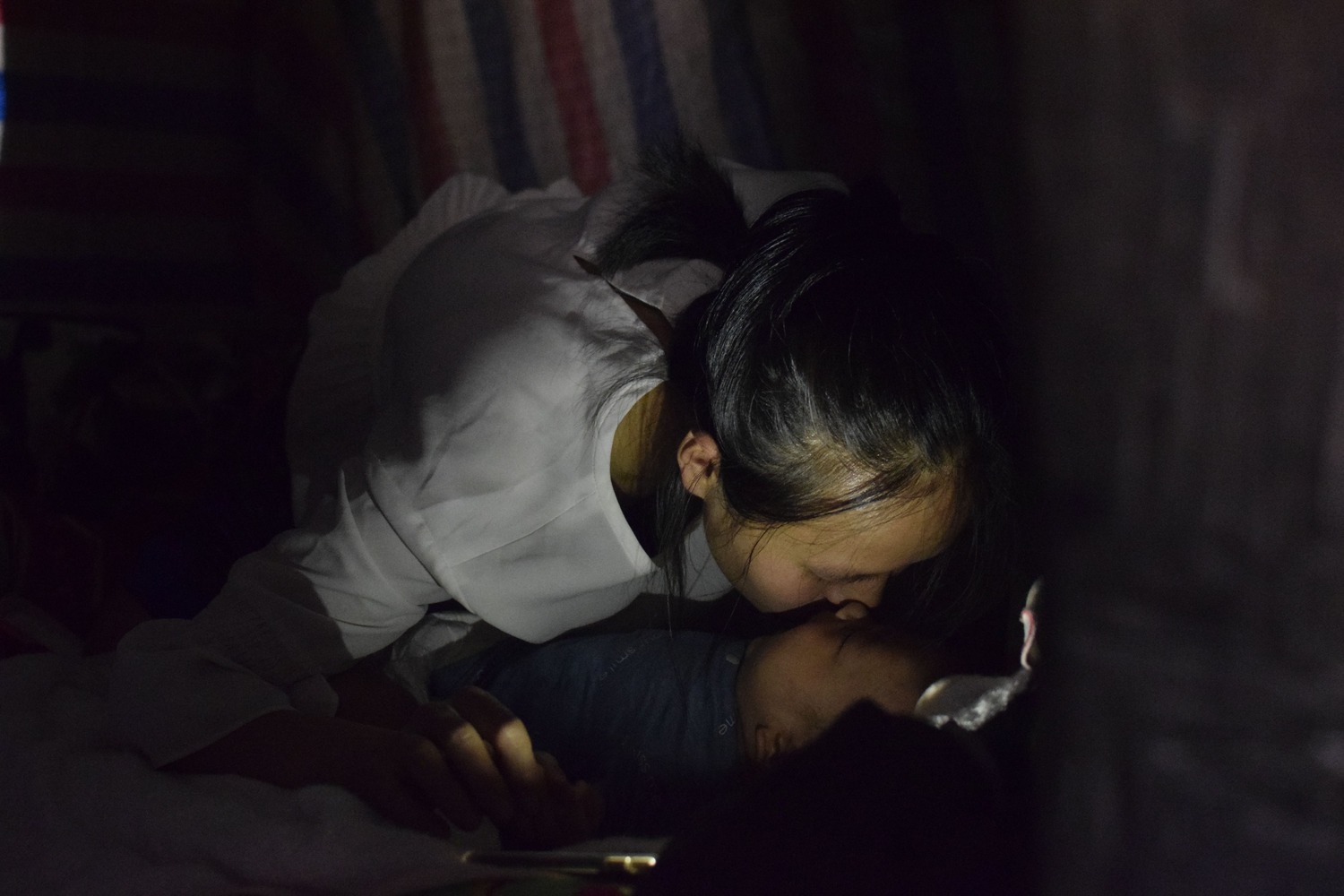- About
- Yen Bai
- Hue
- Ninh Thuan

Mu Cang Chai - Yen Bai
To those who haven’t been here, Mu Cang Chai echoes the feeling of a forsaken, lasting mountainous region, nestled by beautiful terraced fields. And to those who have touched its land, Mu Cang Chai lingers on their soul through its Northern chilly air and the affection contained in the eyes of the locals. More than that, this land, 1000 meters above sea level, is also known for its wealth of minerals, natural resources, and nature's gift of beautiful landscapes. However, all these gifts are not proportional to the livelihood of the locals. Mu Cang Chai is still facing the challenge of finding a suitable livelihood to make its way out of the poorest regions in Vietnam.

To Mua Thi Mua, our character in the project’s second story, Mu Cang Chai is both a friend and a stranger. Though it is not her birthplace, the place itself and its people have been indelibly photographed in her mind by fate. When she was still a law student, she initiated some social projects in Mu Cang Chai. Later, in her visits to her friend’s, who is now her husband, hometown, she became more familiar with the place. Mu Cang Chai reminds Mua of her lovely and intimate Nam Po, Dien Bien where she was born, though it is also a land notorious for drug trafficking, child marriage and human trafficking acrossing Vietnam-Laos border. Life here in this tourist town also shares some similarities with the Hmong community where she grew up. Better than anyone else, in her mind, these images were ingrained: the immensity of the terraced fields, the softness of the golden rays of sunlight every morning, and the pristine water channel flowing from the mountain for irrigation.


Perhaps, these mosaic fragments of memory had kept Mua encouraged to put her first brick into Na Na - a circular economy project aimed to generate income from products of Hmong farmers in Mu Cang Chai. Mua understands that the effort she is making is about just about a brand, but it is for her family, for the Hmong community in the area. They are those who are under the threat of unsustainable livelihoods amid many unexpected fluctuations of life such as pandemics and climate change. Therefore, with the small project that she and her companions cherished, Mu Cang Chai will be the beginning, so that Na Na's spirit will grow and expand to other places in the region, providing tools and techniques for farmers to keep indigenous seeds from the effects of climate change. Especially, through the project's name "Na Na", the Hmong language for "Mother, mother", Mua hopes it will grow through the care of mothers and sisters in the community. Hmong women are gentle and yet they are equally courageous, and they always seek ways to strive despite many challenges in family and farming life.


The Hmong is one of the ethnic minority groups living mainly in the northwest extreme point of Vietnam. The Hmong are not just residing in Mu Cang Chai, or Dien Bien where Mua was born, but also in many different provinces. In recent years, in particular destinations such as Mu Cang Chai and Sapa, tourism has developed, creating more economic resources for the Hmong community. However, these are not sustainable sources of income they could rely on. The life of the Hmong is about the cultivation of terraced fields, honeycombs, chicken coops, and cultivation fields. Therefore, their fundamental livelihood is heavily dependent on nature. Weather changes in recent years have directly affected the life of Hmong households. For women, in particular, tourism brings both opportunities and challenges. The situation indeed offers men different employment opportunities. However, this in turn puts pressure on women, in the name of equality in the family, to go outside to earn money. This is not easy for Hmong women. Prejudice about gender and ethnicity has been deeply rooted in the community, now deepened by the invisible impacts of the pandemic and climate change. Layers of layers pile up creating a vicious circle straining the lives of Hmong women.


In Nam Po, Dien Bien where Mua returns each year, the rainy season comes earlier, yet it is much drier, because precipitation decreases. She can clearly see the difference in her parents' sowing fields compared to the days when she was a little girl following her parents to the fields. It is not just her parents, but all her relatives and acquaintances in the community who are sowing rice in fields with no water available. The rice plant depends on rain, once sown for a few days without water, it will be damaged, and unable to germinate. In phone calls with Mua from a distance, her mother could not explain why “it has been sunny for so long, the seeds could not sprout”. Many farmers have given up farming to work in China. Farming in the traditional Hmong style is very challenging, especially when the weather is hot. Farming used to be simple in cool weather, but now it's more difficult because it's getting warmer. Weather therefore affects their earnings. Last year (2020), Mua's family produced 63 bags of rice, but only 30 for this year.



In Mu Cang Chai whose geographical features considerably differ from Nam Po’s, the story is barely more optimistic. In recent years, the town has been clearly affected by climate change. Once a place that never experienced severe water shortage for its position on the headwaters of many streams, Mu Cang Chai is now facing low rainfall and delayed rainy seasons. Cultivation lands are parched, evident in the highland terraced fields. In the past, forest fires and outdated cultivation methods were considered the principal causes of uncontrollable water volume: water shortage during the dry seasons and excess water during the rainy season. Now, pressure from population growth as well as mass tourism contributes to unpredictable climate change. Because of storms and tornadoes, hundreds of households having their homes in areas with a high risk of landslides must relocate, many irrigation works are severely damaged, and hundreds of hectares of crops are affected, thereby directly affecting the livelihoods of the locals.

To Mua, climate change becomes more pronounced over time. In her somewhat faint memory, Mua remembers her parents and her rushing from their makeshift hut on the mountain into the deep forest because of a sudden big flood when she was only 4 years old. History repeats itself after 12 years, but then Mua was studying at university in Ha Noi , the capital of Vietnam, only listening to her mother over the phone. It wasn't until she started Na Na and spent more time on this community project for her hometown that she saw more clearly the cracks in the waterless fields, the erosion from the landslides, and the obscurity of dangerous trips to look for jobs across borders of women in her community.

The more attached she gets to Na Na and the community, the more she understands the significance of her return this time. When she was a college student, Mua never thought she would come back. To many, her journey is such a paradox. Days and days she tried her best to get out of these sterile fields to come to Ha Noi, eager to explore the world. And yet, after her dream came to a realization, she chose to come back to her birthplace. She is one of the very rare cases in her hometown attending university, though her family and community conditions put a great obstacle to that. What we know is, to finish this four-year bachelor's program in Law, she had experienced all sorts of part-time jobs, including waiting tables for food stalls, so she didn’t have to ask for support from her family.


To Mua, the decision comes as it has to be. She sensed something different in her even when she was little. In the rare moments of resting after reaping the rice, she didn't join her friends to have fun but rather took walks in the deserted forests where she relaxed on the grass, under the trees, talked, and laughed with herself. She loved walking alone, and sometimes the walk was 5-6 km from the family's field back home. She didn't care about getting married or working at the border either, though it was the ideal vision friends her age talked about as they hit puberty.

Higher study is also not an easy decision where Mua was born. Limited economic conditions and identification of ethnic minorities often discourage girls from continuing their higher education. Therefore, instead, they often work in factories on the plains or the border. Or they choose marriage and stay at home to take care of the family. Mua, however, only knew one thing for certain: she wanted to go to university and wanted to continue to learn more about the big, big world around her. Her dream, as we see, doesn't stop at the farms and crops at home, but it travels further and wider.


Now, her dream feeds on her concern for her origin, for the faces she grew up with, and for their sustainable livelihood she considers her responsibility. She has in her other little dreams, one about her own little garden for her own little family, another about movies she could direct in the future. But for now, she is all about the sustainability for which not just Mua but her whole community is yearning.
Mua remembers the day of her first footsteps in Ha Noi for her higher education. On her feet were the honeycomb sandals whose soles were worn out and tinged with earth. Her friend said it would be better for her to change into a pair of high heels or stylish sandals. In response, she simply smiled and continued to go to school in her very same sandals. Years later, Mua still wears this idyllic pair of honeycomb sandals as she treads into the remote hills, instructing each household to store indigenous seeds and take care of their gardens without damaging the land. It is the same honeycomb sandals, and it can't stop her steady footsteps. It is the step of a girl from an ethnic minority community in the highlands, once wanting to come down to the plain to pursue their dreams, who then bravely gave up their ambitions, returning home, on the same steady footsteps, to nurture the land that has nurtured her since birth.